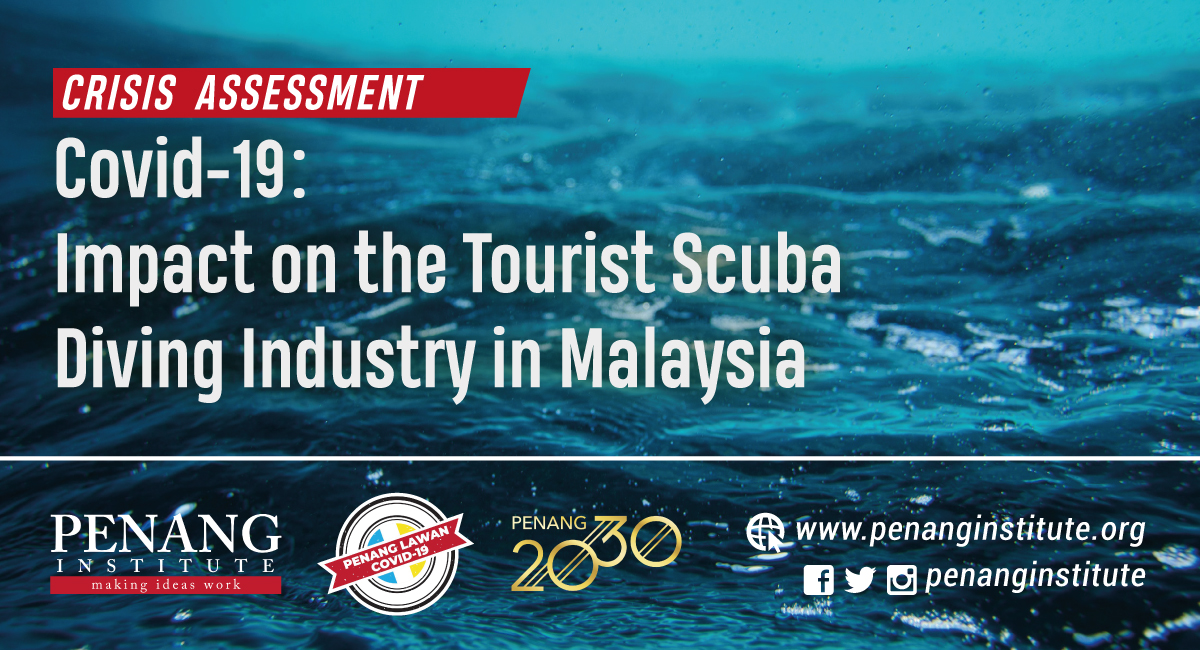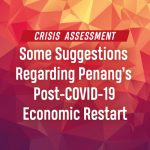EXECUTIVE SUMMARY
- Covid-19 and the resulting travel restrictions around the world, along with the Movement Control Order (MCO) put into place, has severely impacted the tourist and recreational scuba diving industry in Malaysia. And unlike an economic event such as a recession, the lingering effects of a such pandemic will continue to effect travel and recreational activity levels, which will suppress the amount of spending at every socio-economic level.
- Urban dive centres have suffered the loss of retail sales and the revenue from conducting dive trips and classes for divers. Island dive centres have essentially lost half the business season that runs from March through October. And even when diving and training classes are permitted to commence, the flow of divers and dive students is expected to be very low. These island dive centres will suffer most, as they typically rely on limited revenue streams.
- Employment in the diving industry covers a broad spectrum of jobs. Without divers buying equipment, not taking courses, and not traveling, effects are widespread, with no sector of diving-related employment untouched.
- Difficulty with water activities and social distancing guidelines is going to be an ongoing drag on the industry’s ability to rebound. Conducting face-to-face training, whether in the pool or shallow ocean water, has an inherent risk in terms of transmission. And social distancing that will be required on dive boats will reduce capacity by well over 50%.
- Scuba Diving is a leisure sport activity, which makes it vulnerable to any economic downturn, as individuals and families react by cutting their discretionary spending. The scuba industry in Malaysia is particularly vulnerable because a large part portion of income arrives with international tourists and divers who visit the country.
*The writer is a DBA Graduate Student of the School of Business Administration, Wawasan Open University. He is also a dive centre owner and instructor/trainer, and a member of the Malaysian Scuba Diving Association.
INTRODUCTION
The coronovirus pandemic (Covid-19) that has swept the world, has left no industry unaffected. Scuba diving destinations in every country have suffered not just a slowdown, but a complete cessation of its core activity, diving in the ocean. Scanning the job boards, industry vacancies around the world have quickly declined to a near 0%, compared to yearly averages.
As of the end of March, Malaysia’s tourism was already done 23.9%, year on year, due to Covid-19 (Hotstats, 2020 March 30). Since then, with world-wide travel coming to a standstill, restrictions on border crossings, and the domestic MCO in Malaysia, the scuba industry here has shut down completely. There has been nothing happening in scuba, except for the ability to offer online theory classes.
Employment in the scuba industry is closely related to the diving that takes place on the coastal islands of East and West Malaysia. This includes airlines, bus companies, ferries, boat taxis, resorts & hotels, and restaurants. But the most relevant sector is the employment around the dive boats (driver & crew), dive guides & instructors and dive centres (staff and management).
As the MCO has been relaxed in stages, dive centres located in the cities are reopening, but only for retail sales. Pool training is still not permitted, and ocean diving is off-limits. Thus, as an industry built upon the core service of taking divers and students out into ocean waters, when that is not allowed, the industry comes to a virtual halt.
FINANCIAL IMPACT
Scuba in Malaysia is a seasonal activity. With recreational diving shutting down for the Monsoon during November through February, this leaves the industry with eight months during which to generate the bulk of its revenue. With the MCO starting on March 18th, the international border restrictions, and the ban on pool use and ocean activities continuing, the financial impact has been quick – and will be ongoing.
In some diving areas, limited diving will be allowed, but only with dive customers who are already local. The restrictions on state border crossings will severely limit the number of dive customers who would be able to even arrive on the islands.
Even after the state-to-state travel restrictions are lifted, the flow of divers will remain greatly reduced, primarily due to the social distancing restrictions on the dive boats. For divers, therefore, the problem of a planned diving weekend will no longer be about finding accommodations, it will be about the reservation of a seat on the dive boat. This is a reversal from recent years, when the priority concern for a weekend of diving was finding a room on the island.
Of particular impact on tourist traffic to the islands will be the required social distancing on the ferries. This in itself will reduce the visitors to the islands possibly by 50%. Especially where an island is only accessible by larger ferries, due to the distance to be traveled. With less ferry riders relative to fixed fuel costs, this will mean an increase in the price of ferry tickets, which will add further expense to holidays on island.
Island dive centres will be competing for the reduced flow of diver numbers. There will be little or no international travellers; fewer local divers going diving for pandemic-caused economic reasons; fewer island travellers overall due to lowered ferry capacity. This means less new diver courses sold to tourists after arrival on island.
All of these factors add up to a potential long-term adjustment in the scuba tourism market. With lowered numbers of tourists arriving on the islands to engage in scuba diving, there will be serious follow-on effects throughout the service supply chain in the industry.
RECREATIONAL DIVING
For the vast majority, diving is a group activity. Thus, the industry in Malaysia, as in most destinations around the world, relies on boats outfitted for divers and their equipment to travel to preferred dive sites where the underwater scenery is colourful and has a vibrant reef life. These boats typically seek to operate at maximum capacity, which means passengers sitting shoulder to shoulder with someone they don’t know, or just met prior to boarding the boat.
In Malaysia, the dive boats are typically narrow, which means that two divers sitting across from each other, are not separated by a distance that meets the guidelines. So, to maintain social distancing, dive boats will have to reduce their normal passenger by at least 50%. While there are other issues with safety and transmission of the virus, it is the social distancing on the boat that will have the greatest impact on industry revenue.
IMPACT ON EMPLOYMENT
Covid-19 has resulted in total loss of income for those who are engaged in the direct provision of diving services: the dive boat trip, and diver certification courses. As reported very early on (Geraldine, 2020 March 24) instructors and divemasters are mostly freelancers, thus the income loss has been immediate.
To be sure, most of the employed – boat drivers, crew, dive guides are paid a set fee per diver, or per trip, and instructors are typically paid a fee per student. Thus, with no dive customers, there are no revenue to the dive centre, and no fees paid out to the industry workers. With the vast majority of employment in the scuba tourism operating on a casual rather than contracted part-time or full-time basis, the loss of income has been immediate.
Even when the MCO restrictions have been relaxed and inter-state travel resumed, with the expected lower levels of local tourism and the lack of incoming international tourists, the rebound in casual employment will be slow.
RECOMMENDATIONS
All shareholders in the industry will need to reassess their strategic thinking and planning. With the heightened competition that will result from a decreased number of dive customers, dive centres will need to look closely at their marketing, and the diving services they offer, adjusting their operations and focusing on market segments that they have the resources to attract and serve. Dive centres that have exclusively served international tourists, and the local expat community will have to look more at competing for the Malaysian leisure diver market in order to make up for the lost imported revenue.
The casual workers in the industry have already been hit hard – and the struggle will continue. These people may expect to be the last to come back into the day-to-day operations of recreational diving, and will have to look elsewhere for a living wage.
Because, the recreational diving business on the islands has grown and developed on the back of casual workers, the economic pain of the MCO has been dramatic. Casual workers and the businesses that employ them do not have access to the various employee salary programmes that the government has put into place.
Over the past four years, the government moved to recognise scuba diving as one of the official sectors of Malaysia’s international (inbound) tourism market. But it has yet to really regulate scuba the way it has done for other areas of tourism. So, for casual workers there are essentially no protections in regard to the labour law. Since the industry relies on these workers, and diving is now accepted as a contributor to the national tourism revenue, the government should move forward to regulate employment within scuba.
CONCLUSIONS
Unlike memorable economic downturns in 1997 and in 2008-2009, the Covid-19 pandemic will have longer-term ramifications. Looking at the SARS outbreak of 2002-2004, where it took nearly a year before the World Health Organisation declared containment (Nation, 2020, January 29), Covid-19 is far worse. The virus continues to confound researchers in their pursuit of control, prevention, and eventual containment.
This means that the international tourist rebound is going to be pushed much further into the future, and the economic downturn for the scuba industry could linger for a lengthy period. Even with the opening up of domestic tourism, the social distancing restrictions will limit the numbers of tourists to the islands. And with each new wave of Covid-19, we are likely to see at least regional, if not national MCOs implemented, and these will potentially close islands again to travellers.
With no vaccine in sight, the only prudent course of government action is to respond to new waves of Covid-19 with restrictions (MCO) that will suppress the infection rate, and maintain the integrity of the healthcare system.
The island business communities including the dive operators, will have a strong self-interest in following social distancing policies. Should a Covid-19 cluster occur on their island, that island will become an economic dead zone, from which recovery will be extremely difficult. But to achieve social distancing on ferries and on the island, the total number of tourists is to be reduced.
With fewer tourists on island, the competition for their diving Ringgit will become fierce. Most businesses will likely reduce prices. So, unless a dive centre provides a niche service and can maintain fees, their profit margin will be severely affected.
The severity of the price competition will force many dive operators out of business. Only the dive centres and dive resorts that had a healthy balance sheet at the time of the outbreak of the pandemic will have a positive outlook. Businesses that typically operate and sustain themselves on the weekly receipts are going to be at greater risk of closing. Centres and resorts that have significant outstanding bank loans will have trouble servicing their debts.
City-based dive centres whose income is generated from courses, dive trips and equipment sales will see a reduction of business traffic, as long as the social distancing is in place. Price competition will rise, and the likelihood of a lengthy struggle against Covid-19 will force many of these centres to close down.
Until an effective vaccine is soon made available, the size of the Malaysian scuba industry will evolve into a small localised activity.
REFERENCES
Geraldine, A. “Call for monthly assistance to freelance dive instructors, divemasters in Sabah.” New Straits Times 24 March 2020: https://www.nst.com.my/news/nation /2020/03/577800/call-monthly-assistance-freelance-dive-instructors-divemasters-sabah
Hotstats. “Deep dive: Asia performance in the time of COVID-19”. Hotel Online: The B2B news source, 30 March 2020): https://www.hotel-online.com/press_releases/release/ deep-dive-asia-performance-in-the-time-of-covid-19/
The Star, Nation. January 2020: “How SARS impacted tourism”. 29https://www. thestar.com.my/news/nation/2020/01/29/how-sars-impacted-tourism
You might also like:
![Penang Next Normal has to be a Whole-of-Society Effort]()
Penang Next Normal has to be a Whole-of-Society Effort
![Some Suggestions Regarding Penang's Post-Covid-19 Economic Restart]()
Some Suggestions Regarding Penang's Post-Covid-19 Economic Restart
![Penang's Cruise Tourism Industry: Surviving the Covid-19 Perfect Storm]()
Penang's Cruise Tourism Industry: Surviving the Covid-19 Perfect Storm
![Covid-19 Exit Strategies in East Asia: Choosing between a Suppress and Lift Procedure and a Stagge...]()
Covid-19 Exit Strategies in East Asia: Choosing between a "Suppress and Lift" Procedure and a Stagge...
![Specifics of the Impact of Covid-19 on the Young]()
Specifics of the Impact of Covid-19 on the Young







